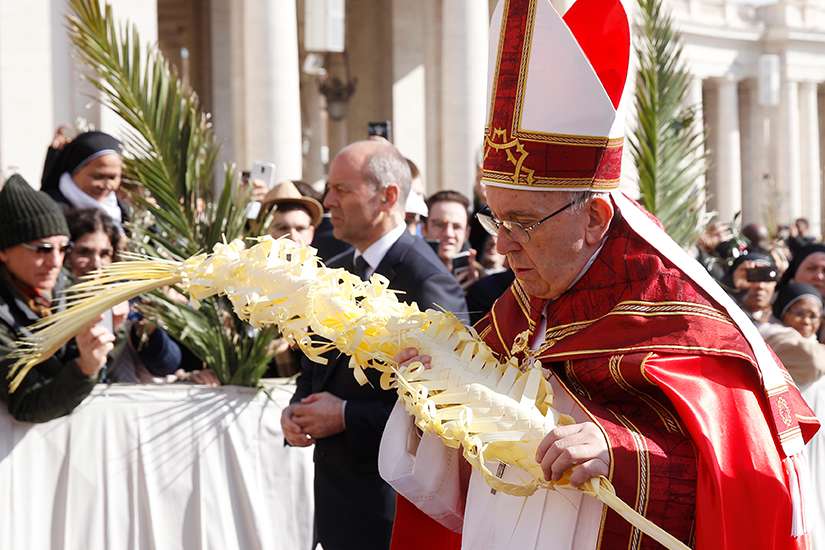The crowd that shouted "hosanna" as Jesus entered Jerusalem included all those for whom Jesus was a source of joy, those he healed and forgave, and those he welcomed after they had been excluded from society, the Pope said in his homily March 25.
But others were irritated by Jesus and tried to silence his followers, the Pope said. In the same way, people today will try to silence young people who continue to follow Jesus, because "a joyful young person is hard to manipulate."
"There are many ways to silence young people and make them invisible," the Pope said. There are "many ways to anesthetize them, to make them keep quiet, ask nothing, question nothing. There are many ways to sedate them, to keep them from getting involved, to make their dreams flat and dreary, petty and plaintive."
Pope Francis asked the young people "not to keep quiet. Even if others keep quiet, if we older people and leaders keep quiet, if the whole world keeps quiet and loses its joy, I ask you: Will you cry out?"
Gabriella Zuniga, 16, and her sister Valentina Zuniga, 15, were among the thousands in St. Peter's Square. The sisters, students at Stoneman Douglas High School in Parkland, Florida, had participated March 24 in the local Rome "March for Our Lives," calling for gun control.
The Palm Sunday Mass marked the local celebration of World Youth Day and included the more than 300 young adults who, at the Vatican's invitation, had spent a week discussing the hopes, desires and challenges facing the world's young people and ways the Catholic Church should respond.
At the end of the Mass, they formally presented their final document to the Pope; it will be used, along with input from the world's bishops' conferences, in drafting the working document for the Synod of Bishops in October, which will focus on young people, faith and vocational discernment.
Holding five-foot tall palm branches, the young adults led the procession to the obelisk in the center of St. Peter's Square. They were joined by others carrying olive branches and by bishops and cardinals holding "palmurelli," which are intricately woven palm fronds.
In his homily, Pope Francis said that the Palm Sunday Mass, which begins with the singing of "hosanna" and then moves to the reading of Jesus' passion, combines "stories of joy and suffering, mistakes and successes, which are part of our daily lives as disciples. "
The acclamation of the crowd praising Jesus as he enters Jerusalem gives way to the shouts of "crucify him" as Jesus' suffering and death draw near, the Pope noted. "It somehow expresses the contradictory feelings that we too, the men and women of today, experience: the capacity for great love, but also for great hatred; the capacity for courageous self-sacrifice, but also the ability to 'wash our hands.'"
The Gospel also demonstrates how the joy Jesus awakened in some is "a source of anger and irritation for others," Pope Francis said, and the same is true today.
Joy is seen in all those "who had followed Jesus because they felt his compassion for their pain and misery," the Pope said. "How could they not praise the one who had restored their dignity and hope? Theirs is the joy of so many forgiven sinners who are able to trust and hope once again."
But others in Jerusalem, "those who consider themselves righteous and 'faithful' to the law and its ritual precepts" and "those who have forgotten the many chances they themselves had been given" find such joy intolerable, the Pope said.
"How hard it is for the comfortable and the self-righteous to understand the joy and the celebration of God's mercy," he said. "How hard it is for those who trust only in themselves, and look down on others, to share in this joy."
The shouts of "crucify him" did not begin spontaneously, the Pope said, but were incited by those who slandered and gave false witness against Jesus, "'spinning' facts and painting them such that they disfigure the face of Jesus and turn him into a 'criminal.'"
Theirs, he said, was "the voice of those who twist reality and invent stories for their own benefit, without concern for the good name of others" and "the cry of those who have no problem in seeking ways to gain power and to silence dissonant voices."
Pope Francis told the young people gathered in the square that in the face of such attempts to demolish hope, kill dreams and suppress joy, Christians must look to Christ's cross and "let ourselves be challenged by his final cry. He died crying out his love for each of us: young and old, saints and sinners, the people of his times and of our own."
"We have been saved by his cross, and no one can repress the joy of the Gospel," he said. "No one, in any situation whatsoever, is far from the Father's merciful gaze."


